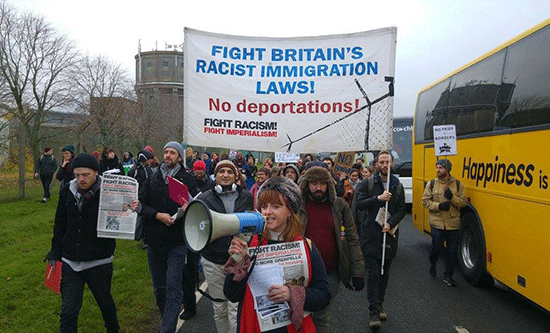
Borders, Migration and Class in an Age of Crisis: Producing Workers and Immigrants, Tom Vickers, Bristol University Press 2019 (available from Larkin Publications £17+pp)
For those who want to understand immigration in the context of global capitalism, this is an important and helpful book. Vickers situates the movement of people in the 21st century as the result of the spread of monopoly capitalism to every corner of the world, creating, as the title says, classes of workers and the status of migrant for millions. This is a continual process, at this moment in time which is, as the author shows, an age of crisis. The reader is introduced to questions of the division in the working class, both domestically and internationally, the emergence of increased precarity in labour conditions and the response of national governments and labour movements. All of this is within the context of a racialised commentary by the media and enforcement by the legal system.
The relevance of this publication is obvious for our understanding of events right now. On the same day that the Supreme Court ruled that Uber drivers should be treated as workers rather than as self-employed, an article on agricultural workers in Britain appeared in the Financial Times, ‘Brexit: the low-paid migrant workers “trapped” on Britain’s farms’. There is no doubt that the ruling that Uber drivers are indeed the company’s ‘workers’ is a legal victory. Nonetheless Uber drivers remain as ‘piece workers’ by which payment is made on productive work time. The time waiting for a fare, care of transport, etc are all given for free by the worker so that his/her wage has to stretch over this time as well.
The full implications of this and similar forms of payment are to be seen in the conditions of seasonal agricultural workers in the UK. Under the Seasonal Workers’ Pilot Scheme, launched in 2019, two ‘labour providers’, Concordia and Pro-Force, have government contracts to recruit seasonal farm workers. This scheme is designed to make up for the shortage of agricultural labour following Brexit. Up to 30,000 six-month visas for such workers have been made available for 2021. Whereas agricultural workers who came to Britain under EU Freedom of Movement were able to move from farm to farm, these are ‘bonded’ labourers in a scheme which ties them to one specific location. Conditions of labour are extreme. Pickers report being regularly checked every two hours or so and if their rate of work does not please, being taken off the job and ‘sent back to the caravan’ with no payment for the rest of that day. Canada, Germany and New Zealand are among other countries that have a version of the scheme which has now been adopted by Britain.
How has it come about that forms of bonded labour, once so characteristic of Britain’s colonial plantation economy, have come to have a role in food production in this country? Why are there areas of labour that are almost exclusively performed by migrant workers and why are sections of the British working class now experiencing the same conditions of low pay and precarious work as those of overseas workers? Vickers writes about how these and other forms of employment have rapidly escalated in the 21st century. They are the result of the internationalisation of the army of reserve labour that capitalism creates among the proletarians in which ‘the general movements of wages are regulated … by the varying proportions in which the working-class is divided into active and reserve army’ (Marx, quoted p140). The global spread of the capitalist mode of production, monopoly capitalism, results in a world-wide division of the working class into what Vickers has tagged ‘an active labour army’ (ALA), and a reserve army of labour (RAL). This is realised in the context of state borders. While the RAL-ALA composition can differ between national sections of the working class, it also differs according to other divisions across and within territorial boundaries.
The format of this book is academic and references to the research of other scholars are to be found on almost every page. Nevertheless, there is a clear narrative line here and many interviews which give the reader the real voices of migrant workers, campaigners and communities. The author covers the political context and legislative histories of the British state on immigration law, which include access to public funds (state benefits), documentation and right to remain. He also gives an account of asylum claims and how the British state deals with this, often through the words of the refugees themselves.
Perhaps unusually for a university publication, the author also describes many of the organisations of resistance and the campaigns active for the defence of social and civil rights and includes the experiences of self-organisation by the migrant community. The use of repressive force by the police and other functionaries of the state is presented here, as well as the continual use of racialised jargon and hostility by the media as a running commentary on the unfolding events of migration to Britain.
This is an important and comprehensive work for those who wish to understand how it is that a new form of the old agricultural plantation economy has emerged in the UK in the age of monopoly capitalism and how it signifies changes that will affect the working class across the globe.
Susan Davidson
FIGHT RACISM! FIGHT IMPERIALISM! 281 April /May 2021




